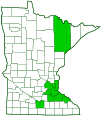Wedge-shaped beetles
(Ripiphorus spp.)
Overview • Description • Distribution • Taxonomy
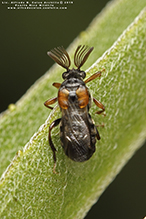
Overview
Ripiphorus is the largest genus of wedge-shaped beetles. There are about 70 Ripiphorus species worldwide, about 30 species in North America north of Mexico, and at least 2 species in Minnesota. There are a number of records of the genus in Minnesota, but none of those records have identified the species.
Ripiphorus occurs in the United States, in Mexico, in Ontario, Canada, and in Europe. Larvae are parasites of sweat bees and other bees, and eventually kill their host. Adults live only a few days and are found on flowers and other vegetation. Information about their lives, including dietary preferences, is fragmented. The genus is in need of revision.
Description
Ripiphorus beetles look more like wasps or flies than beetles. Adults are ⅛″ to 7 ⁄16″ (4 to 11 mm) in length.
The head is vertical and is strongly constricted behind the eyes. The neck is inserted in the first thoracic segment (prothorax). The upper surface (vertex) is distinctly elevated above the front (anterior) margin of the upper thoracic plate (pronotum). The pair of chewing structures of the mouth (mandibles) are prominent and bent inward. There are two small, black, oval, prominent, compound eyes and no simple eyes (ocelli). The eyes are situated on the side of the head leaving a broad upper face (frons). The antennae are inserted above the eyes on each side of the vertex. On the female they have ten or eleven segments and may have projections on one side of each segment (monoflabellate), both sides (biflabellate), or be simply deeply sawtoothed (serrate). On both sexes, there are no projections or teeth on the first two segments.
The pronotum is broad. It does not have a sharp lateral ridge or a distinct suture. It is as wide at the base as the abdomen. The base has a large lobe in the middle that covers the plate over the wing bases (scutellum). The scutellum is exposed when the insect bends down to feed.
The abdomen of the female is deeply curved at the end, so much that the ovipositor is directed forward. The hardened forewings (elytra) are very short, convex, and scale-like. They do not extend beyond the thorax. The hindwings are entirely exposed.
The legs are short. The last part of the leg (tarsus), corresponding to the foot, is black and has five segments. On the hind leg it has only four segments. The first and last tarsal segments on the hind leg are the longest, the third segment is the shortest. There is a pair of toothed claws at the end of each tarsus.
Distribution |
||
|
Sources |
|
| 10/25/2025 | ||
Taxonomy
Order
Coleoptera (Beetles)
Suborder
Polyphaga (Water, Rove, Scarab, Long-horned, Leaf, and Snout Beetles)
Infraorder
Cucujiformia
Superfamily
Tenebrionoidea (darkling beetles and allies)
Family
Ripiphoridae (wedge-shaped beetles)
Subfamily
Ripiphorinae
Subordinate Taxa
californicus group
California wedge-shaped beetle (Ripiphorus californicus)
Mutcher’s wedge-shaped beetle (Ripiphorus mutchleri)
fasciatus group ![]()
banded wedge-shaped beetle (Ripiphorus fasciatus) ![]()
wedge-shaped beetle (Ripiphorus americanus)
wedge-shaped beetle (Ripiphorus schwarzi)
hyalinus group ![]()
British Columbia wedge-shaped beetle (Ripiphorus columbianus)
Walsh’s wedge-shaped beetle (Ripiphorus walshii)
wedge-shaped beetle (Ripiphorus flavicornis)
wedge-shaped beetle (Ripiphorus iridescens)
luteipennis group
Nevada wedge-shaped beetle (Ripiphorus nevadicus)
sallow-winged wedge-shaped beetle (Ripiphorus luteipennis)
wedge-shaped beetle (Ripiphorus diadasiae)
wedge-shaped beetle (Ripiphorus minimus)
wedge-shaped beetle (Ripiphorus sexdens)
popenoei group
wedge-shaped beetle (Ripiphorus popenoei)
wedge-shaped beetle (Ripiphorus smithi)
scaber group
wedge-shaped beetle (Ripiphorus epinomiae)
wedge-shaped beetle (Ripiphorus neomexicanus)
wedge-shaped beetle (Ripiphorus nomiae)
wedge-shaped beetle (Ripiphorus scaber)
wedge-shaped beetle (Ripiphorus solidaginis)
wedge-shaped beetle (Ripiphorus aurantus)
wedge-shaped beetle (Ripiphorus rex)
wedge-shaped beetle (Ripiphorus vierecki)
Zesch’s wedge-shaped beetle (Ripiphorus zeschii)
Synonyms
Dorthesia
Kipiphorus
Myiodes
Myodites
Polychronia
Rhipidophorus
Rhipiphoru
Common Names
This genus has no common name. The common name for the family Ripiphoridae is wedge-shaped beetles, and it is applied here for convenience.
Glossary
Elytra
The hardened or leathery forewings of beetles used to protect the fragile hindwings, which are used for flying. Singular: elytron.
Frons
The upper front part of an insect’s face, roughly corresponding to the forehead.
Ocellus
Simple eye; an eye with a single lens. Plural: ocelli.
Pronotum
The exoskeletal plate on the upper side of the first segment of the thorax of an insect.
Prothorax
The first (forward) segment of the thorax on an insect, bearing the first pair of legs but not wings.
Scutellum
The exoskeletal plate covering the rearward (posterior) part of the middle segment of the thorax in some insects. In Coleoptera, Hemiptera, and Homoptera, the dorsal, often triangular plate behind the pronotum and between the bases of the front wings. In Diptera, the exoskeletal plate between the abdomen and the thorax.
Vertex
The upper surface of an insect’s head.
Visitor Photos
Share your photo of this insect.
This button not working for you?
Simply email us at info@MinnesotaSeasons.com.
Attach one or more photos and, if you like, a caption.
Alfredo Colon |
||
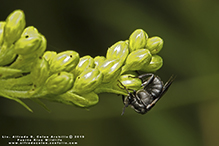 |
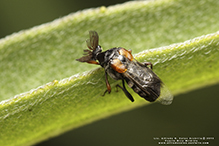 |
|
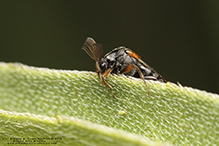 |
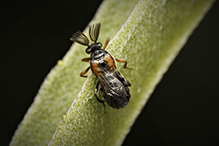 |
|
 |
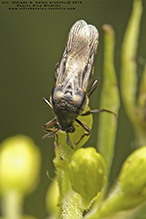 |
|
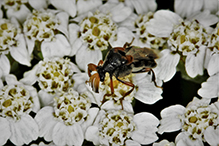 |
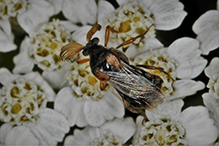 |
|
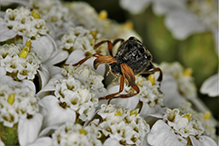 |
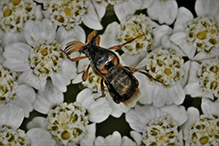 |
|
MinnesotaSeasons.com Photos
|

Slideshows

Visitor Videos
Share your video of this insect.
This button not working for you?
Simply email us at info@MinnesotaSeasons.com.
Attach a video, a YouTube link, or a cloud storage link.
Other Videos

Visitor Sightings
Report a sighting of this insect.
This button not working for you?
Simply email us at info@MinnesotaSeasons.com.
Be sure to include a location.
Minnesota Seasons Sightings

